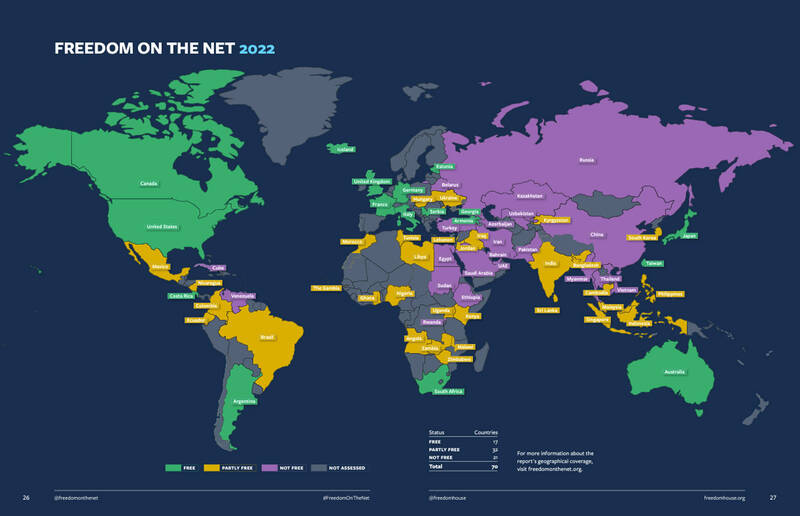Taiwan ranked fifth in Internet freedom worldwide and first in Asia, while China remained at the bottom of the list, an annual report released yesterday by the US nonprofit organization Freedom House said.
Topping this year’s Freedom on the Net report were Iceland, Estonia, Costa Rica and Canada, while Taiwan and the UK tied for fifth during the one-year period that ended in May.
Taiwan retained the same ranking as last year in the Freedom House survey and analysis that ranks countries based on its assessment of obstacles to Internet access, limits on content and breaches of user rights.

Photo from the 2022 Freedom House Freedom on the Net report
Taiwan is an example of how the private sector can work with civil society, government entities and academia to design innovative responses to online danger, the report said.
In Taiwan, which faces a barrage of disinformation that can be traced to China, Japan-based messaging application Line worked with civic groups to develop a tool for users to report false information trending on its platform, the report said.
The government launched a similar coordination effort following the Russian invasion of Ukraine, aiming to track war-related disinformation emanating from China, Freedom House said.
On the other end of the spectrum, China was listed as the worst abuser of Internet freedom for the eighth consecutive year, below Iran and Myanmar.
Internet censorship in China intensified during the Beijing Olympics and after Chinese tennis star Peng Shuai (彭帥) accused a high-ranking Chinese Communist Party (CCP) official of sexual assault, Freedom House said.
The Chinese government has continued to tighten its control over the nation’s booming technology sector, adopting among other measures new rules that require platforms to use their algorithm to promote CCP ideology, the report said.
For this year’s report, Freedom House surveyed 70 countries, which account for 89 percent of the world’s Internet users, and it ranked 17 as “free,” including Taiwan and Japan, while 32 were rated as “partly free” and 21 as “not free.”
Global Internet freedom slid for the 12th consecutive year, with the sharpest downgrades documented in Russia, Myanmar, Sudan and Libya, the report said.
Following Russia’s invasion of Ukraine, the Kremlin dramatically intensified its ongoing efforts to suppress domestic dissent and accelerated the closure or exile of the country’s remaining independent media outlets, it said.
In at least 53 countries, users faced legal repercussions for expressing themselves online, which often led to draconian prison terms, said Freedom House, a Washington-based nonprofit organization that conducts research and advocacy on democracy, political freedom and human rights.
However, Internet freedom improved in a record 26 countries, the report said.

ACTION PLAN: Taiwan would expand procurement from the US and encourage more companies to invest in the US to deepen bilateral cooperation, Lai said The government would not impose reciprocal tariffs in retaliation against US levies, President William Lai (賴清德) said yesterday, as he announced five strategies to address the issue, including pledging to increase Taiwanese companies’ investments in the US. Lai has in the past few days met with administrative and national security officials, as well as representatives from various industries, to explore countermeasures after US President Donald Trump on Wednesday last week announced a 32 percent duty on Taiwanese imports. In a video released yesterday evening, Lai said that Taiwan would not retaliate against the US with higher tariffs and Taiwanese companies’ commitments to

‘SPECIAL CHANNEL’: Taipei’s most important tasks are to stabilize industries affected by Trump’s trade tariffs and keep negotiations with Washington open, a source said National Security Council Secretary-General Joseph Wu (吳釗燮) arrived in the US for talks with US President Donald Trump’s administration, a source familiar with the matter said on Friday. Wu was leading a delegation for a meeting known as the “special channel,” the Financial Times reported earlier. It marked Trump’s first use of the channel since returning to the White House on Jan. 20. Citing a source familiar with the matter, the Financial Times reported that Minister of Foreign Affairs Lin Chia-lung (林佳龍) was also a part of the delegation. The visit came days after China concluded war games around Taiwan and amid Trump’s

Intelligence agents have recorded 510,000 instances of “controversial information” being spread online by the Chinese Communist Party (CCP) so far this year, the National Security Bureau (NSB) said in a report yesterday, as it warned of artificial intelligence (AI) being employed to generate destabilizing misinformation. The bureau submitted a written report to the Legislative Yuan in preparation for National Security Bureau Director-General Tsai Ming-yen’s (蔡明彥) appearance before the Foreign Affairs and National Defense Committee today. The CCP has been using cognitive warfare to divide Taiwanese society by commenting on controversial issues such as Taiwan Semiconductor Manufacturing Co’s (TSMC, 台積電) investments in the

HELPING HAND: The steering committee of the National Stabilization Fund is expected to hold a meeting to discuss how and when to utilize the fund to help buffer the sell-off The TAIEX plunged 2,065.87 points, or 9.7 percent, to close at 19,232.35 yesterday, the highest single-day percentage loss on record, as investors braced for US President Donald Trump’s tariffs after an extended holiday weekend. Amid the pessimistic atmosphere, 945 listed companies led by large-cap stocks — including Taiwan Semiconductor Manufacturing Co (TSMC, 台積電), Hon Hai Precision Industry Co (鴻海精密) and Largan Precision Co (大立光) — fell by the daily maximum of 10 percent at the close, Taiwan Stock Exchange data showed. The number of listed companies ending limit-down set a new record, the exchange said. The TAIEX plunged by daily maxiumu in just